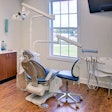
In dentistry, there is a definite division in thought toward distributing products in the office: those who embrace "selling" in office, and those that shudder at the mere thought of recommending products.
 Carrie Ibbetson, RDH.
Carrie Ibbetson, RDH.Oral health supplies are big business. According to WorldDental.org, from 2011 alone, billions of dollars were spent on products alone.
Your patients want to know what products to use and how to use them. They also want to feel like you have their best interest at heart, and not just your hands in their pocketbooks.
Why not embrace the idea of becoming a one-stop shop for your patients' needs? Below are a few upsides and downsides to product distribution in office.
The upsides to selling products in office:
- You have the opportunity to be a savior in your patients' eyes. The last thing they want to do is search the oral health aisle of the supermarket looking for a specific product while they have a dozen other items on their shopping list. Embrace the stormy seas of product knowledge, and show up with a lifesaver for them.
- You have the opportunity to explain what products to use and how to best use them. When patients understands how to use a product, they are much more effective with it (that is, their compliance improves). As a bonus, your patients will talk about this to their friends and family, and it may well increase your new patient base.
- It allows you to create value for your practice. Patients want to feel that you have their health in mind. Sharing new and effective products with them shows that you are passionate about their health, which is another great return on investment.
- It gives you the opportunity to stay on top of new products. Knowledge is power.
- It allows you the opportunity to increase profitability of the hygiene department. Products sold in office often have a 30% to 70% markup, adding a great deal to your overall bottom line. Talking to your sales reps and asking for a better price will often get you a better deal than what is quoted in the catalogue.
- Offer your patients free or reduced prices on their products as long as they come in for regularly scheduled appointments. This is another great way to retain patients and encourage them to return.
- When there is a problem with a device, your patients will tell you all about it. Although this may seem like a downside, it is a great way to show your patients that you care about them and the investments they make in their health.
The downsides to selling products in office:
- Inventory control: Someone has to be responsible for ordering and maintaining supplies.
- Missing products: Yes, it is a reality that products sometimes grow legs. Offer a discount to your staff, or include a monthly "allowance" for their home care products.
- Understanding how products work and why they work: Initially, this can be time-consuming and frustrating. For example, an oral irrigator is a great tool, but many people find it messy until they know to keep their head down in the sink and let the water flow instead of build up. Also, different electric toothbrushes adapt to teeth and gums differently. If you are going to carry products, you want to know how they work so that you can help your patients best use them. You will have people that question the cost, ask for a discount, or they will tell you that they can get things cheaper at the big stores. Again, this gives you the opportunity to help your patients. Let them know that when they purchase products in the office, you have the opportunity to show them how to use the products most effectively, which is a huge cost savings over time.
Dentistry is, in a way, all about sales. You have to "sell" the crown that the patient needs, you have to "sell" the deep cleanings, or shorter intervals of hygiene, and like it or not you "sell" your staff's values and ethics.
Just like anything new, selling products in office may be a bit uncomfortable at first, but by overcoming this, you can leverage customer acquisition and retention. Make this another way to show patients that you have their best interest at heart.
Carrie Ibbetson is a registered dental hygienist and oral health coach in Southern California. She founded and runs the sites NaturalGumption.com and OralHealthCoaching.com, and has been featured on Lifehack.org and KIWI.com. For more information about Ms. Ibbetson and Natural Gumption, please visit her sites.
The comments and observations expressed herein do not necessarily reflect the opinions of DrBicuspid.com, nor should they be construed as an endorsement or admonishment of any particular idea, vendor, or organization.



















